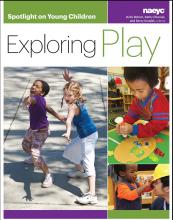Excerpt from Spotlight on Young Children: Exploring Play

Memo to: Early Childhood Program Directors
From: Mary Mackrain
Date: January 2015
Subject: Play Is Vital for Healthy Brains and Relationships
Play offers rich, daily experiences as children negotiate with peers, engage in makebelieve, and discover the world around them. Participating in play can be thought of as lighting up the circuitry board of a computer, with children’s experiences firing up neuron connections in their developing brains (Center on the Developing Child at Harvard University 2011). The prefrontal cortex, in conjunction with other parts of the brain, is where executive functioning takes place—enabling children to hone functions like self-regulation, attention, and problem solving. All of these are critical ingredients for learning throughout life.
Play also provides a natural learning environment for children to develop healthy, meaningful relationships. Young children are still working on the skills to solve conflicts, engage in productive back-and-forth with peers, and share an array of feelings in healthy ways. When adults offer gentle guidance and support in the course of children’s play, children learn to negotiate the messy and sometimes unpredictable circumstances they face. Managing strong emotions, understanding others’ emotions, and learning to trust and ask for help are valuable life skills formed through the interactions that play supports.
Directors can support teachers by ensuring sufficient resources to provide playful learning environments. In addition, encourage teachers to provide lots of play opportunities for the children in their classrooms. Doing so now will enable you and the teachers to give children the tools they need to talk about how they feel in safe ways, handle daily challenges, solve problems, and focus on important tasks—forever.
Reference
Center on the Developing Child at Harvard University. 2011. “Building the Brain’s “Air Traffic Control” System: How Early Experiences Shape the Development of Executive Function.” Working Paper No.11. http://www.developingchild.harvard.edu.
From Spotlight on Young Children: Exploring Play, by Derry Koralek, Holly Bohart, and Kathy Charner. Copyright © 2015 by the National Association for the Education of Young Children.
